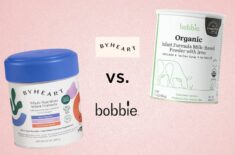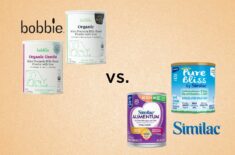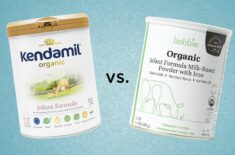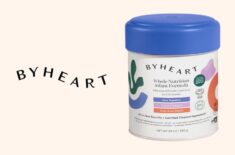Overview
Why choose organic, hypoallergenic formula for your baby? There’s a lot of debate on whether organic baby food products are worth the higher price tag. But you might consider that paying extra may be better than worrying about possible toxic chemicals in your baby’s formula. (1)
California-based pediatrician Dr. Michelle Perro recommends choosing non-GMO organic baby formulas. She explains that these formulas can reduce the risks of your baby developing allergies, endocrine disruption, autoimmunity, autism, and ADHD (attention deficit hyperactivity disorder). (1)
These formulas don’t have GMOs (genetically modified organisms) and are sourced from crops grown without insecticides, herbicides, or pesticides. (2)
Dr. Perro points out: (1)
“There are modifications to the immune function that can take place prenatally and early in life which leads to the above disorders (“developmental immunotoxicity”). Increased exposure to environmental toxins during those sensitive times may contribute to the health conditions noted above.”
But aside from considering organic formulas, you might need to choose a hypoallergenic baby formula if your child has sensitivities or allergies to certain components found in regular options.
Food allergies happen because your baby’s immune system mistakenly believes that certain components in the food or formula are harmful invaders. (3)
Cow’s milk protein allergies are among the most common food allergies. Still, as many as 8-14% of babies allergic to cow’s milk may also react to soy. (3)(4)
How Do I Know If My Baby Needs Hypoallergenic Formula?
Although it can vary among different children, these symptoms may appear just a few minutes after your child drinks something they’re allergic to: (3)
- Wheezing
- Itchy, watery, or swollen eyes
- Trouble breathing
- Coughing
- Hoarseness
- Vomiting
- Stomach upset
- Diarrhea
- Hives
- Swelling
- Throat tightness
- A drop in blood pressure (may cause lightheadedness or loss of consciousness)
Allergic reactions are potentially life-threatening. So, it’s important to immediately tell your pediatrician if your baby experiences any of these symptoms. (3)
While there aren’t many options for these types of formulas, picking an organic, hypoallergenic formula can give you some peace of mind.
But you should also consult with your pediatrician before making any changes to your child’s formula.
Learn more about these formulas below.
Is There An Organic Hypoallergenic Formula?
Standard formulas are made of cow’s milk. If your baby reacts to cow’s milk proteins, your pediatrician is likely to recommend dairy-free options.
Soy formulas are among the most common non-dairy options. But if your child is allergic to it, you might need to pick a hypoallergenic option.
The following are some hypoallergenic formulas made from organic sources:
HiPP Hypoallergenic Combiotik – 21.2 oz (600 g) pack
- It’s a European baby formula with hydrolyzed proteins.
- It features special components like prebiotics, probiotics, and essential fatty acids to promote your baby’s brain development and health. (5)(6)(7)
Baby’s Only Organic Pea Protein Formula – 12.7 oz can
- It can be a value-friendly, organic formula for your baby.
- The brand claims that it may be the only pea-based formula in the market.
HiPP HA Combiotik



Best Features & Safety
- It’s a European baby formula with hydrolyzed proteins.
- It’s manufactured and packaged in Germany.
- It’s a non-GMO formula that’s free from added sugars and corn syrup.
- It has a combination of prebiotics and probiotics that may better promote a healthier gut. (5)(6)
- Probiotics are ‘friendly’ gut bacteria that may help prevent constipation, inflammation, and infections. (5)
- Prebiotics are special fibers that probiotics use as a food source. (6)
- It features special components essential fatty acids to promote your baby’s brain development and health. (7)
- It may be suitable if your baby has skin reactions, digestion problems, or hay fever-like symptoms due to cow’s milk protein sensitivity.
Ingredients
- Whey protein hydrolyzate
- Lactose
- Vegetable oils (palm oil, rapeseed oil, sunflower oil)
- Prebiotics GOS (galacto-oligosaccharides) from lactose
- Calcium orthophosphates
- Potassium chloride
- LCP (long-chain polyunsaturated fatty acids) from a mixture of oils (vegetable and fish oils)
- Natural lactic acid probiotic cultures (Lactobacillus fermentum hereditum)
Nutritional Facts
Each serving (3.4 oz) contains:
- Calories: 66 kcal
- Total fats: 3.5 g
- Total carbohydrates: 6.9 g
- Vitamin A: 70 mcg
- Vitamin D: 1.2 mcg
- Vitamin K: 5.1 mcg
- Choline: 4.9 mg
- Vitamin E: 1.1 mg
- Iron: 0.5 mg
- Calcium: 50 mg
- Potassium: 88 mg
Product Recall
- HiPP HA Combiotik is among the formulas from European brands recalled in August 2021 for not meeting FDA requirements. (8)
- Able Groupe voluntarily recalled all variants and lots/batches of European baby formula brands HiPP, Holle, Bioland, and Kendamil. (8)
- According to the recall advisory, these products were sold by the Little Bundle website and are not available in any retail stores. (8)
- The FDA requires all infant formulas sold in the US to have at least 1 mg iron per 100 calories. It’s done to help prevent iron-deficiency anemia, especially because these are the primary source of nutrition for formula-fed babies. (8)
- The FDA explained that inadequate iron intake during infancy can lead to iron deficiency anemia. If left untreated, it may cause irreversible cognitive and functional development outcomes. (8)
- Many of these European formulas have iron levels below the minimum requirement. (8)
- The FDA further requires brands to put a label indicating the possible need for iron supplements if any product fails to meet the minimum standards. But HiPP and the other European brands didn’t have these safety labels. (8)
- These formulas also didn’t have English labels, which are required under the FDA’s standards. (8)
- Also, though these products were made in Europe, the FDA still requires them to submit premarket notifications before being sold in the US. The above-mentioned brands also failed to do it. (8)
- The recall is being coordinated between Able Groupe and the FDA. Affected consumers can send an email to [email protected] for any questions or concerns relating to the recall. (8)
These are the other HiPP products included in the recall:
- HiPP Anti-Reflux Milk Formula
- HiPP Comfort Milk Formula
- HiPP Dutch Combiotic Infant Milk Formula
- HiPP German Combiotic Infant Milk Formula
Although the recall advisory suggests that you should discard these products immediately, these formulas may still be safe for consumption. (8)
But consult your pediatrician before giving your child new formula, especially one with a recall.
Because these were recalled due to low iron content, your pediatrician might recommend iron supplementation so your baby can meet their daily nutritional requirements.
Pros & Cons
Pros
- It doesn’t contain any starch, added refined sugars, maltodextrin, or corn syrup.
- It’s also free from soy, gluten, corn syrup, preservatives, and synthetic nutrients.
- It uses lactose as the main carbohydrate. Biochemist and author Rebecca Fett suggests choosing formulas with lactose because it’s one of the main components of breast milk. (9)
- It also contains whey proteins. Fett also suggests picking a formula with whey instead of casein (another protein in cow’s milk) because they’re easier to digest by your baby’s still-developing tummy. (9)
- It has both probiotics and prebiotics to support a healthier digestive system for your baby. (5)(6)
Cons
- It had a recall in 2021. (8)
- It contains some questionable vegetable oils.
What Customers Say
Positive Reviews
“I absolutely love this formula. My twins were born early & suffered horribly from acid reflux. They were on so many formulas & nothing worked until I found this! My only regret is not finding this sooner.” Reviewer on Little Bundle.
“Bought HIPP for my little premature grand baby! All the American formula she tried made her sick & cranky. She wasn’t gaining any weight. After being in HIPP for ONE week – she gained a pound, her hair is growing and her demeanor is happy. Can’t say enough good things! Shipping was painless and above expectations! Thank you!” – Reviewer on Bottles and Burp website.
“Hipp ar has been an absolute life changer for my 4 month old baby girl. She’s struggled since birth with reflux. We tried every hypoallergenic and elemental formula in the US and pump inhibitors she was miserable and struggling to gain weight. At her 4 month check up she went from being in the 30th percentile at 2 months to the 50th and 90% with length. Her doctor was shocked! She loves this formula, doesn’t spit up nearly as much and when she does she’s a “ happy spitter”. Actually naps and sleeps through the night snd no longer needing medication. Amazing.” – Reviewer on Bottles and Burp website.
Negative Reviews
“Baby is refusing to drink so not sure if it’s good but switched from HIPP stage 1 to HIPP HA because of reflux. I realized that there was a different formula for reflux after ordering so a little bummed about that as well.” – Reviewer on Bottles and Burp website.
“We tried various formulas starting with Hipp regular then Hipp AR to deal with our sons reflux. We eventually moved to HA but it’s also super thin consistency so it hasn’t helped with that.” – Reviewer on Bottles and Burp website.
“This formula was recommended by our pediatrician. The quality seems to be excellent, however our baby has extremely foul-smelling gas and **** on this formula…not sure why.” – Reviewer on Organic Baby Food Shop.
Baby’s Only Organic Pea Protein Formula


Best Features & Safety
- It’s a non-GMO toddler formula for children over a year old.
- The brand claims that it’s the only pea-sourced formula currently sold on the market.
- This plant-based formula may be ideal for vegetarian and Kosher diets.
- It contains essential fatty acids that may help promote brain and eye development. (10)
Ingredients
- Organic pea protein concentrate
- Organic brown rice syrup
- Organic high oleic oil (sunflower or safflower)
- Organic canola oil
- Organic linoleic sunflower oil
- Organic coconut oil
- Organic sunflower lecithin
Nutrition Facts
Each serving (4 fl oz) contains:
- Calories: 80 calories
- Total fats: 4 g
- Protein: 2 g
- Total carbohydrates: 9 g
- Vitamin A: 70 mcg
- Vitamin D: 1.3 mcg
- Vitamin K: 7 mcg
- Choline: 10 mg
- Vitamin E: 1.1 mg
- Iron: 1.4 mg
- Calcium: 90 mg
- Potassium: 110 mg
Product Recall
- None
Pros & Cons
Pros
- It’s certified Kosher by the OU (Orthodox Union).
- This non-GMO toddler formula is made with ingredients grown without pesticides, insecticides, or weed-killers such as glyphosate.
- It’s free from glucose and corn syrup solids.
- It doesn’t have any palm olein oil or palm oil. While it’s a common ingredient in many infant formulas, palm oil may affect calcium absorption and possibly lead to lower bone density. (11)
Cons
- It’s a toddler formula that’s designed for kids over 12 months of age.
- It has a processed sweetener, brown rice syrup.
- It also contains highly processed vegetable oils, such as canola oil.
- According to Nature’s One, this product meets the guidelines for baby formula composition set by the U.S. Infant Formula Act and the AAP (American Academy of Pediatrics). But pea protein-based formulations haven’t been approved for commercial use yet.
What Customers Say
Positive Reviews
“My Son has a dairy and soy allergy. After trying all the hypoallergenic formulas including the amino base ones and nothing working I gave up. I was expecting to breast feed until he turned 1, until I found Nature’s One! This is the only formula that my son eats with ease, doesn’t upset his stomach and doesn’t constipate him.’” – Reviewer on Nature’s One.
“A wonderful formula for my children and have never had bad reactions, God forbid! My son doesn’t tolerate dairy as well as my daughter does, so I have to purchase the pea protein formula for him. Fortunately for me, Baby’s Only offers me that option. This formula is a simple and effective way to supplement their diet and ensure they’re getting their essential vitamins and minerals everyday. And they’re always excited to get their ‘milk!’” – Reviewer on Nature’s One.
“So thankful for a dairy free option other than Soy. Our little one doesn’t have anything severe, but doesn’t digest dairy well and would spit up curdled milk pretty consistently while on dairy based formula. She also has some mild reflux which this formula seems to be cutting down the spit up by at least 50%. Ingredient wise, I do wish there was a better substitute other than Canola oil. Also, while pea protein is very digestible, I have found the brown rice syrup to be slightly constipating which is why we have her on a daily probiotic which keeps her regular and combats any issues formula might give her in that area. This formula is harder to dissolve than some of the others, so we’ve found using a thin skinny whisk does wonders for breaking the clumps down!!” – Reviewer on Nature’s One.
Negative Reviews
“I am so disappointed that this company switched the recipe on this formula and now has added canola aka rapeseed oil. My baby cannot tolerate it and is spitting up each meal. I scoured the earth to find a suitable plant based formula and this was it until they made the switch. 🙁 Now I have to go back to the drawing board again. The new formula of this formula also does not break down in water like the old one did. It’s hard to mix.” – Reviewer on Nature’s One.
“Do not feed this to your kid! It’s for adults and not children. Taste it and find out. Taste your own breast milk. You will see the difference. This is as honest as it gets. I am using it for smoothies and baking vegan cookies!” – Reviewer on Amazon.
“Honestly I feel good giving this to my lactose intolerant baby however it’s very hard to get past the smell which I’m surprised there are not more comments about. As soon as I opened the jar for the first time I almost heaved. it smells just like dog food. The pea smell is very overpowering and I like peas but something about this smells repulsive. when mixed it smells even worse. I thought my baby would gag. surprisingly he drinks it with no problem! his spit up and burps smell disgusting though.” – Reviewer on Amazon.
Summary & Recommendation
There are several hypoallergenic formulas that you can choose for your baby, but most of them aren’t organic.
If you prefer organic formulas, you can choose the following:
HiPP Hypoallergenic Combiotik – 21.2 oz (600 g) pack
- If you prefer a European baby formula with hydrolyzed proteins
- If you want a formula with special ingredients like prebiotics, probiotics, and essential fatty acids for your baby’s brain development and health (5)(6)(7)
- If you don’t mind the higher price than Baby’s Only
Baby’s Only Organic Pea Protein Formula – 12.7 oz can
- If you want your baby to try the only pea protein-based formula in the market
- If you don’t mind that pea formulas haven’t been approved for commercial use
Still, you should remember to consult your pediatrician before changing your baby’s formula.
Organic Hypoallergenic Formula FAQs
Are Organic Options Better Than Regular Formulas?
According to studies, frequent consumption of organic products may not have a significant nutritional advantage compared to a regular diet. But it may reduce the risks of eczema (itchy skin rash caused by an allergic reaction) in infants. (12)
Your child might have a lower risk of developing allergic sensitization, the process in which the immune system considers various substances as a threat. (13)(14)
They may also be at a lower risk of having otitis media, metabolic syndrome, obesity or high BMI (body mass index), and non-Hodgkin lymphoma, a type of cancer. (13)(14)
What Proteins Trigger Allergies In Cow’s Milk Formulas?
Cow’s milk has two kinds of proteins, both of which can trigger an allergic reaction. (15)
- Casein – it’s the solid part or curd of the milk
- Whey – it’s the liquid part of the milk; it remains liquid in your baby’s tummy and may be easier to digest
Can I Choose Goat Milk Formula If My Baby Has Cow’s Milk Protein Allergies?
No, unless your child’s pediatrician recommends it. Although goat’s milk has smaller proteins, they still have a similar structure to cow’s milk and may cause an allergic reaction, too. (16)
Some people also think that goat’s milk is non-dairy because it’s not from cows. But dairy or milk comes from mammals, including cows, goats, sheep, and buffalo.
Can I Give Lactose-Free Sensitive Formula To My Baby with Cow’s Milk Protein Allergies?
Although they are often confused, lactose intolerance and cow’s milk protein allergy are two different conditions.
- Lactose intolerance may be due the inability of your baby’s tummy to digest lactose. While it can cause discomfort, colic, gas, infant reflux, and fussiness, it’s rarely life-threatening. (4)
- Cow’s milk allergy is due to the immune system’s incorrect reaction against the milk proteins. Severe cases can be dangerous because the allergic reaction can cause breathing difficulties. (4)
Lactose-free formulas removed the lactose, but they might still have intact cow’s milk proteins.
- If your kid has lactose intolerance, you may opt for lactose-reduced or lactose-free sensitive formulas instead of picking a hypoallergenic one. (4)
- If your little one has milk allergies, you can still pick a lactose-free formula but make sure that it’s also dairy-free. (4)
What Are Some Hypoallergenic Formulas?
The following formulas are also hypoallergenic, but they aren’t made from organic ingredients:
Enfamil Nutramigen Baby Formula – 19.8 oz can
- Enfamil claims that it’s clinically proven to reduce colic in 48 hours.
Similac Alimentum – 19.8 oz can
- Similac claims that it’s clinically proven to reduce crying because of protein sensitivity in 24 hours.
Nestlé Alfamino Infant Formula – 14.1 oz can
- It contains higher calcium levels which may help support your baby’s bone development.
PurAmino Hypoallergenic Infant Formula – 14.1 oz can
- This iron-fortified, amino acid-based formula contains omega-3 DHA and omega-6 ARA.
Neocate Infant Hypoallergenic Formula with DHA/ARA – 14.1 oz can
- It’s an amino acid-based formula that contains nucleotides, DHA, and ARA to help support growth, brain development, and a healthier immune system for your baby.
Similac Elecare – 14.1 oz can
- It’s an amino acid-based formula that has prebiotics.
Your baby’s pediatrician can help you choose the best formula to suit your baby’s needs.
Dairy-Free Soy Formulas
If your child is allergic to milk but not to soy, then these products may be an option for them:
- It’s free from milk and lactose.
- This soy formula has DHA.
Enfamil ProSobee Soy-Based Infant Formula
- This soy formula contains DHA and may help ease gas and fussiness caused by sensitivity to milk-based formulas.
Similac Soy Isomil Infant Lactose-Free Formula
- The brand claims that this formula is clinically proven to support the developing immune system.
- It contains prebiotic FOS (fructooligosaccharides).
Parent’s Choice Soy Infant Formula
- It’s a lactose-free formula that contains DHA, lutein, and vitamin E that may help with brain and eye development. (7)
Make sure to consult your pediatrician before switching to any of these formulas.
Sensitive Organic Formulas
Your options include lactose-free, reduced-lactose, or partially hydrolyzed formulas such as the following:
Happy Baby Sensitive Organic Infant Formula
- Its lactose content is reduced by 75%, which can help ease gas and fussiness.
- This organic formula can provide complete nutrition for your baby and has DHA, ARA, and prebiotics.
- It has reduced lactose content and uses hydrolyzed proteins.
- This organic formula contains probiotics (Lactobacillus fermentum) and prebiotic dietary fibers (GOS or galacto-oligosaccharides).
Plum Organics Gentle Infant Formula
- It has partially hydrolyzed proteins that may help reduce gas and fussiness.
- It’s free from corn syrup solids but has lactose as its primary carbohydrate.
- It has DHA and ARA that may help with brain and eye development. (7)
- It’s USDA-certified organic and is free from GMOs, dairy, and gluten.
- Rebecca Fett recommends this formula if your baby has a family history of allergy or eczema. (9)
Still, it’s best to seek advice from your child’s pediatrician before switching to these formulas.
Organic, Dairy Formulas
The following formulas have organic ingredients, but they’re made from milk. They shouldn’t be given to babies with cow’s milk protein allergies.
Remember, goat milk proteins have a similar structure to those in cow’s milk. (16)
Happy Baby Organic Formula with Iron
- It’s made with organic lactose, key vitamins and minerals in breast milk, and prebiotics.
- It’s a full cream goat’s milk sourced from organic farms that follow the strictest EU (European Union standards).
- It also has DHA.
- It’s modeled after breast milk and contains prebiotics, DHA, and vitamins A and E. (7)
Earth’s Best Organic Dairy Infant Powder
- It’s USDA-certified organic.
- This non-GMO formula also contains omega-3 DHA and Omega-6 ARA that may support brain and eye health. (7)
HiPP Organic First Infant Milk
- It’s a whey-based formula with organic lactose, organic GOS prebiotics (galacto-oligosaccharides), and fish oil.
You may use these formulas to supplement breastfeeding, but make sure to always consult with your pediatrician before picking a new formula for your baby.
REFERENCES
(1) https://www.greenamerica.org/blog/downsides-gmo-infant-formula-we-asked-pediatrician
(2) https://www.usda.gov/media/blog/2012/03/22/organic-101-what-usda-organic-label-means
(3) https://kidshealth.org/en/parents/milk-allergy.html
(4) https://www.kidswithfoodallergies.org/formula-options-for-infants-with-food-allergies.aspx
(5) https://www.healthychildren.org/English/ages-stages/baby/formula-feeding/Pages/Probiotics-in-Infant-Formula.aspx
(6) https://pubmed.ncbi.nlm.nih.gov/25535999/
(7) https://pubmed.ncbi.nlm.nih.gov/29413359/
(8) https://www.fda.gov/safety/recalls-market-withdrawals-safety-alerts/able-groupe-recalling-products-labeled-infant-formula-formulas-have-insufficient-iron-levels
(9) https://brainhealthfrombirth.com/formula/
(10) https://pubmed.ncbi.nlm.nih.gov/20329590/
(11) https://pubmed.ncbi.nlm.nih.gov/16582027/
(12) https://pubmed.ncbi.nlm.nih.gov/32519524/
(13) https://www.ncbi.nlm.nih.gov/pmc/articles/PMC7019963/
(14) https://www.immunology.org/policy-and-public-affairs/briefings-and-position-statements/allergy
(15) https://www.mayoclinic.org/diseases-conditions/milk-allergy/symptoms-causes/syc-20375101
(16) https://pubmed.ncbi.nlm.nih.gov/12882742/












